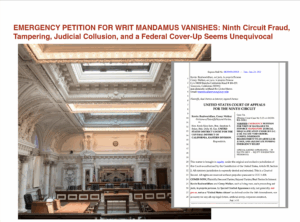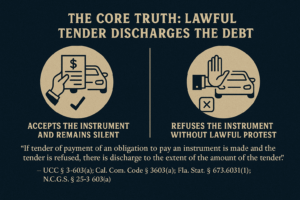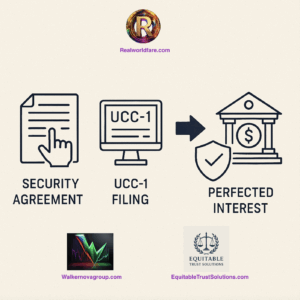When a purported borrower takes out a loan from a bank, it may appear that the bank is lending its own money. However, under 12 U.S.C. § 83, banks are prohibited from lending their own funds. Instead, they use the purported borrower’s promissory note as collateral to create credit, not using their own capital. This process lacks transparency, leading to non-disclosure and fraud, which may render such agreements void ab initio (invalid from the outset).
How the Scheme Works
The purported loan you receive from banks like Sierra Pacific Mortgage Company, Sofi, JP Morgan Chase, Wells Fargo, San Diego County Credit Union, Georgia’s Own credit Union, and other are absolutely not a loan, but rather a return of your own equity and a swap of your valuable promissory note, for “credit.” A simple “currency exchange” and 99% of the people in the United States don’t comprehend this and fall victim to coercion and extortion every single day.
The purported loan is actually based on your own credit and financial signature. The bank essentially monetizes your promissory note as an asset but fails to disclose these details to you, lacking the full disclosure and transparency required by law.
Has JP Morgan Chase Bank, Sierra Pacific Mortgage Company, or Wells Fargo disclosed the fact that they never credited your accounts?
What Is the “Color of Law”?
The term “color of law” refers to actions that appear to be legally justified but are used to violate or infringe upon legal rights. Banks, in this context, misrepresent the loan process by pretending they are providing their own money when they are actually using the purported borrower’s promissory note to create credit.
The Loan Process and the Lack of Full Disclosure
When a purported borrower signs a loan agreement, the bank deposits the promissory note as an asset and creates credit based on that note. The funds credited to the purported borrower’s account do not come from the bank’s reserves but are generated from the note. This method, while consistent with fractional reserve banking, is not fully disclosed to the purported borrower.
Without this disclosure, the bank’s actions teechnically constitute fraud, as the purported borrower is misled into believing they are receiving the bank’s own money and thus they feel obligated to pay it back. This deceit and lack of essential information makes the agreement also technically. void ab initio. Void from the beginning.
Have they informed you that your promissory note is treated as an asset and not a liability?
Did they reveal that, by law, the purported borrower (you) is actually the creditor?
Legal Remedies for Purported Borrowers
- Demand Complete and Full Disclosure: Purported borrowers can request all loan details under consumer protection laws. If the bank fails to disclose that the purported borrower’s note funds the loan, the borrower may challenge the validity of the contract.
- Invoke UCC and Common Law Protections: The Uniform Commercial Code (UCC) covers negotiable instruments like promissory notes. If the bank’s conduct violates these provisions, the purported borrower may seek to void the contract or obtain relief under the UCC. Fraudulent inducement to contract can also be addressed under common law.
- Cite the Agreement’s Void Status: An agreement lacking full disclosure may be considered void ab initio. Courts often rule in favor of borrowers who can demonstrate that they were misled or that material facts were withheld.
- Legally Claim the Assets and Be the Executor of Your Own Estate: The purported borrower can assert control over their assets and act as the executor of their own estate, taking charge of their financial matters legally.
- File a Lawsuit: If fraud or misrepresentation is evident, the purported borrower has the option to file a lawsuit against the bank for damages and to seek remedies under applicable state and federal laws.
Conclusion
Banks cannot legally lend their own money as stipulated by 12 U.S.C. § 83. By engaging if fraud and deceit and failing to disclose this and misrepresenting the nature of loans and financial products, banks like Sierra Pacific Mortgage Company, Sofi, JP Morgan Chase, Wells Fargo, San Diego County Credit Union, Georgia’s Own credit Union, and other, operate under the color of law, misleading purported borrowers into thinking they receive bank funds. This lack of full disclosure constitutes fraud, making such agreements potentially void ab initio. Understanding your rights, including legal remedies such as claiming your assets, filing lawsuits, and invoking UCC provisions, is vital to protect yourself from these practices.




